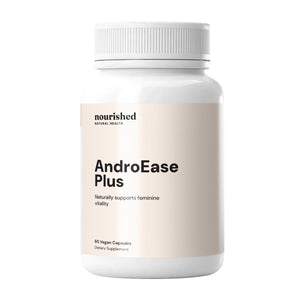Spearmint Tea for PCOS: Benefits, How Much & Best Time to Drink
Spearmint tea is widely used to manage the effects of polycystic ovary syndrome (PCOS), mainly because of its anti-androgenic properties. Research has proven that spearmint tea could potentially lower testosterone levels in women with PCOS and subsequently improve PCOS symptoms like hirsutism.
Additionally, studies have also shown that the consumption of spearmint tea in women with PCOS not only decreases the levels of free testosterone in the blood but also increases luteinizing hormone (LH) and follicle-stimulating hormone (FSH).
Spearmint tea offers a safe, natural, and effective option that you can try to manage your symptoms better.
Is Spearmint Tea Good for PCOS?
Spearmint has been used as a natural medicinal herb since ancient times to treat minor illnesses such as gastrointestinal disturbances, nausea, painful urination, and skin irritations. In recent times, spearmint has gained popularity among women with PCOS primarily because of its visible efficacy in treating hirsutism or increased growth of male-pattern hair in women of childbearing age.
Spearmint tea does not claim to be a cure-all for PCOS, but it is backed by scientific research to effectively address some of the condition's most common (and bothersome) symptoms. Consider the following:
- Anti-androgenic and testosterone reduction: An animal model research has shown the positive effect of spearmint tea on PCOS, particularly in lowering levels of testosterone and androgens.
- Improved endocrine profile: In the study above, animals with PCOS also showed improved endocrine health markers after consuming spearmint extract.
- Increase in FSH, LH, and estradiol: Spearmint tea has been proven to affect the levels of female hormones responsible for regulating the menstrual cycle.
Benefits of Spearmint Tea for PCOS
In addition to the points mentioned above, let’s take a closer look at the specific health benefits of spearmint tea for PCOS:
Regulates Androgen Levels: According to research, elevated levels of androgenic hormones are common in women with PCOS and may cause secondary disorders like hirsutism, infertility, acne, alopecia, and irregular menstruation. Spearmint tea provides an accessible, low-cost alternative to medications—and could be part of a holistic PCOS management regimen.
Reduces Free Testosterone: In a study where women with PCOS drank spearmint tea twice a day for a month, the group showed significantly lower levels of free and total testosterone compared to a placebo group. This effect can help reduce acne and male-pattern baldness often exacerbated by high testosterone.
May Help Regulate Menstrual Cycles: Hormonal imbalances can disrupt the menstrual cycle. Spearmint tea’s ability to lower androgens while raising hormones like estrogen, LH, and FSH makes it a powerful aid in achieving more regular menstrual cycles. Animal studies also suggest it may decrease ovarian cysts and increase viable eggs, supporting potential fertility benefits.
Has Antioxidant Properties That Reduce Inflammation: Women with PCOS often have low-grade chronic inflammation, indicated by elevated markers like C-reactive protein. Spearmint tea contains high-quality antioxidants that can lower oxidative stress, helping to calm chronic inflammation and protect overall health.
Relieves Symptoms of Indigestion, Bloating, and Gas: PCOS is linked to gut health issues, leading to bloating, nausea, hyperacidity, and other gastrointestinal discomforts. Spearmint’s carvone content inhibits gut muscle contractions, effectively soothing digestive upset.
Acts as a Diuretic and Can Help Reduce Water Retention: Spearmint tea works as a gentle diuretic, encouraging fluid balance and reducing water retention. Its vitamin A and C content also supports healthy skin, hair, and immune function.
How Much Spearmint Tea Should You Drink?
Spearmint tea can be prepared and consumed like other herbal teas. Bring water to a boil, steep the tea leaves or bag for 3–5 minutes (covered), and remove before drinking. Most studies recommend 2–3 cups daily. Remember, results develop gradually—consistent use over at least five to six months yields the best outcomes.
When Is the Best Time to Drink Spearmint Tea?
Drinking one cup in the morning and one before bedtime is ideal for maintaining steady hormone modulation. Consuming spearmint tea during the follicular phase (days 1–14) of your cycle appears especially effective at decreasing testosterone and boosting hormones responsible for ovulation.
Are There Natural Alternatives to Spearmint Tea?
Spearmint specifically targets androgen-related symptoms in PCOS and isn’t interchangeable with peppermint or generic mint teas. However, green tea can complement your regimen—its potent antioxidants and potential anti-androgenic effects work best in extract form for PCOS purposes. Combining both may support blood sugar balance, weight management, and further reduce inflammation.
Supplements to Boost Results
Enhance your spearmint tea routine with our Androgen Blocker Plus. This evidence-based supplement combines botanicals like Saw Palmetto, Green Tea Extract, and Reishi Mushroom to further reduce excess androgens, support clear skin, and promote cycle regularity. Together, tea and supplements create a comprehensive approach to managing PCOS naturally.
Shop Spearmint Tea Shop Androgen Blocker PlusFrequently Asked Questions
- Is spearmint tea effective for all PCOS subtypes? It’s most beneficial for symptoms driven by high androgen levels, such as hirsutism and acne.
- Any side effects? Generally safe in moderate amounts. Consult a healthcare practitioner if taking medications.
- When will I see results? Many women notice improvements in hair growth, acne, and cycle regularity within 8–12 weeks.
- Safe during pregnancy or breastfeeding? Limit intake and discuss with your doctor to avoid potential uterine effects.
- How should I prepare tea for maximum benefits? Steep in covered boiling water for 3–5 minutes, then remove leaves or bag to prevent bitterness.
References
- American Journal of Clinical Nutrition, animal model study on testosterone reduction.
- Journal of Endocrinology and Metabolism, research on endocrine profile improvement.
- National Institutes of Health (NIH) reports on inflammation and antioxidant effects.




